Spelling mistakes accidentally on purpose
Many content professionals would recoil in horror at the very idea of a spelling or grammatical mistake being used deliberately. However, brands are using this tactic more often than you may think. Our brains have been conditioned to pick up on mistakes, errors and things that look out of place. Therefore, using this tactic within your sales and marketing communications might sound less daft than you think!
In our blog, we explain how brands are using errors to engage their target market, to come across as more human in an age of artificial intelligence (AI) and even come out from making a mistake with more credibility! We showcase some examples where this has happened.
In a world where accurate communication is highly valued, intentionally making spelling mistakes might seem counterintuitive. However, there exists a creative niche that appreciates the beauty and expressive power of intentional misspellings. By deliberately bending the rules of language, individuals can create unique, playful, and thought-provoking pieces of writing. In this blog post, we'll explore the concept of making spelling mistakes on purpose, highlighting its artistic appeal and shedding light on how it can be used as a form of self-expression.
Sales and marketing leaders understand the statistics, it can take up to 19+ attempts to gain someone’s attention or people's time as little as 2.7 seconds on a website before they move off onto something else. So no wonder why businesses are resorting to all sorts of tactics just to get noticed and get people to engage.
Readers might wonder that in the age of spellcheck and grammar correcting software, as well as the rise AI, then might have been seen as impossible to make a mistake these days? But making mistakes such as spelling, or indeed design errors, is far more of a human trait. Therefore, for us fellow humans, who are good at detecting errors, our brains inevitably go looking for other errors. So no wonder brands have used this to their advantage. In an impersonal world, modern mistakes are seen as humanistic, a ‘real’ person has made a genuine mistake, a miss-worded phrase or two sentences that have an alternative meaning when put together.
Take the ASOS packaging example that went viral, turning a negative into a positive. By suggesting that the wrong packaging is more exclusive than the correct packaging, they created a buzz around the brand and showed that they have real people busy behind the brand who have made this innocent mistake. This example may have been a genuine one, but it didn't do them any harm. (if you would like to read more from this example, then click here.
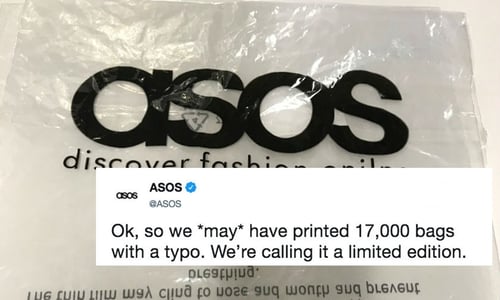
Would your brand be prepared to stoop to the level of making a deliberate mistake? In many cases, we believe that the answer is 'no'. However, recovering from a genuine mistake, we see brands as becoming increasingly more confident not to cover them up, but rather embrace innocent errors and turn them into a positive.
Some campaigns can turn an intentional mistake to their advantage in a world filled with audiences being bombarded every day by communications competing for their share of voice. So what make a 'good mistake'? The mistake has to be believable, clever, controversial or funny. Clever ones don’t tend to involve grammar, but a word(s) that could have been innocently mishit on a keyboard.
The Appeal of Intentional Spelling Mistakes:
-
Creativity and Innovation: Intentional spelling mistakes can act as a form of creative rebellion against conventional grammar and spelling rules. They allow writers to break free from linguistic constraints and explore new possibilities. By embracing intentional misspellings, individuals can infuse their work with a distinct and unconventional flair.
-
Expressive Freedom: Language is a tool for self-expression, and intentional spelling mistakes offer an additional layer of expressive freedom. By altering the spelling of words, writers can convey emotions, attitudes, and unique character traits more effectively. Misspellings can add humour, playfulness, and even a touch of authenticity to the written word, enabling writers to connect with their audience in unconventional ways.
-
Aesthetic Appeal: Intentional spelling mistakes can create a visual impact that adds aesthetic value to written work. Unique spellings can help capture attention, break monotony, and engage readers. When used strategically, intentional misspellings can serve as stylistic devices, leaving a lasting impression on the reader.
Using mistakes as simple clickbait can leave the audience feeling cheated, therefore be careful and help the audience/reader be onside. For example, spam emails will often contain bad grammar on purpose to stop the reader in their tracks and get them to look for the explanation further down the email or by clicking a click. People are savvy to these methods and it can work against you. It is better to use a spelling mistake in a fun or clever way where it catches the reader's eye and gets them to stop and think, even making the correction in their mind (see Snickers example below).
In our opinion, you still can’t beat a well-thought-out piece of researched and written piece of content, which helps your audience by educating, helping, engaging and nurturing them to understand further your proposition (why not read our many blogs and features regarding Inbound Marketing on what works best).
Here are some examples below, some genuine mistakes and some intentional. However, they are all being shared and commented on long after the event....
1. Makes you read it from Snickers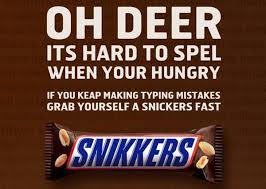
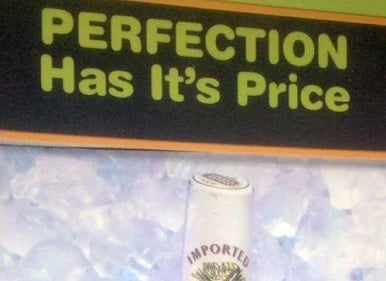
3, Learning - Good
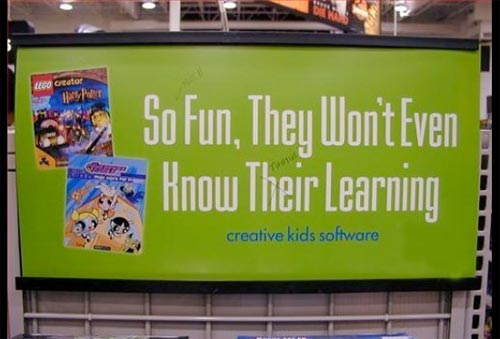
4. I can imagine quite a lot of snacks!
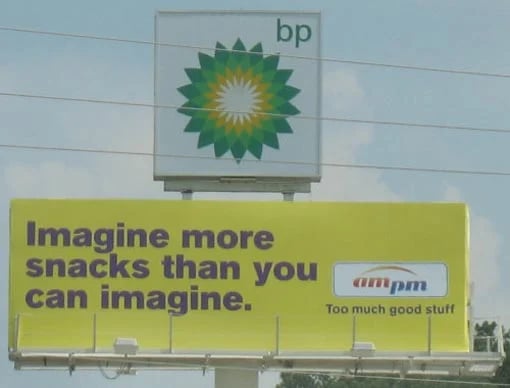
5, Double take, while your brain works it out, nice 👍
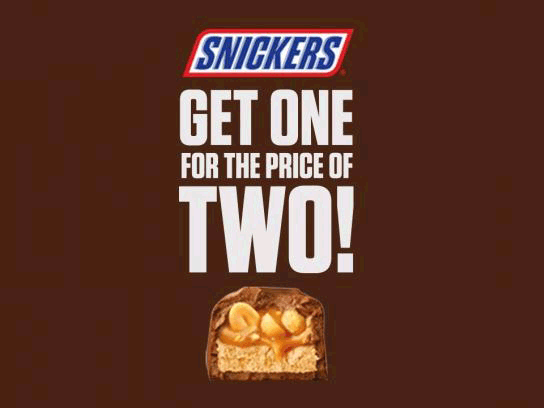
Practical applications of intentional mistakes:
-
Advertising and Marketing: In the world of advertising, intentional spelling mistakes can be used to grab attention and create memorable campaigns. Brands often employ creative misspellings to highlight their products or services, evoke curiosity, and stand out in a crowded market. It can help establish a distinct brand identity and foster a sense of relatability with target audiences.
-
Literature: Intentional spelling mistakes can inject a sense of rhythm, sound, and imagery into literary works. Writers can use unconventional spellings to add depth to their characters, create regional dialects, or emphasise the rhythm and flow of their verses. By challenging linguistic norms, authors can break barriers and create a unique literary experience.
-
Social Media and Internet Culture: The rise of social media platforms and internet culture has given birth to a new wave of creative expression. Intentional spelling mistakes are commonly employed in memes, captions, and hashtags to convey humour, irony, or a sense of belonging within specific online communities. Such deliberate deviations from correct spelling can foster a sense of shared identity and camaraderie among internet users.

Conclusion: While spelling mistakes are typically seen as errors, intentionally incorporating them into writing can be a powerful tool for self-expression, creativity, and communication. By embracing intentional misspellings, individuals can explore new dimensions of language and engage with their audience in unique and memorable ways. Whether in advertising, literature, or online communication, the deliberate use of misspellings opens doors to endless possibilities, challenging traditional norms and adding a touch of artistry to our written expressions.
Finally, before you pick up on our grammar and spelling in this blog, we hope you enjoyed them? If you have any examples of any good, bad and the downright ugly brand mistakes done intentionally or otherwise, then please share them with us, and we'll mention them in our next reiteration and credit you 👍
Here at Secret Source, we manage written and social content for many of our clients. If you would like some help in this area, or with your wider marketing operation/campaigns etc. then please fill in the form by clicking the link below, and we'll be in touch.
Written by Nick Carlson
Nicholas Carlson is a seasoned marketeer with over 25 years of experience driving impactful strategies across a wide range of industries. With a specialism in SaaS, Technology and Professional Services type organisations. As part of the team at Secret Source, he brings deep insight into the evolving landscape of marketing. Nicholas is passionate about partnering with marketing, sales, and business leaders to enhance marketing delivery and fuel sustainable business growth.
